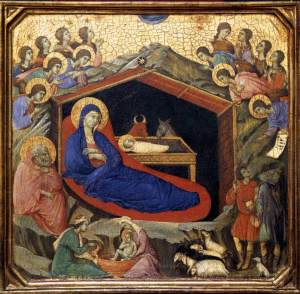
The traditional words to the medieval poem, now sung as a carol talk of man being constrained, not by disease and plague but by sin. The carol bases its thinking on the salutary tale of original sin as recounted in the book Genesis. This tale, written thousands of years ago reminds man that he can never escape sin and that temptation is all around. The birth of Christ, celebrated on Christmas Day is, to some, the beginning of the process of redemption. Other faiths and those of none take differing view on redemption and the idea of freedom. At times in the history of mankind, we are brought up short and reminded that we are fallible and that nature will always dictate our lives. In times of war and conflict, sadness and bereavement and, as we currently find ourselves, sickness and plague we are brought up short and nature imposes on us a time of reflection; a time to slow our lives and consider how we behave towards our world and one another.
Adam Lay y Bounden, bounden in a bond: just as we find ourselves today, we find ourselves bound in our own lives and communities, freedoms have been taken away and suddenly the natural world seems far more real. The sounds of birdsong have become louder; the perfumes of nature, of flowers and grasses more intense; the colour of the changing seasons have invaded our spaces but, around the world quietness has become more evident.
We have come once again to the silence of the Winter Solstice, the days are short and, in the north, the nights are long and cold but the cycle of life continues and we think again, as we have for over two thousand years about the birth of a baby whose life was to fundamentally change the world forever. Belief in a biblical nativity is, perhaps, at times difficult and theologically very imprecise; the nativity only appears in the gospels of Luke and Matthew in the bible we accept today. We have however, testamentary evidence of a man, who was a preacher and who was offered up to the Roman authorities for crucifixion. Written in Josephus, a respected Roman historian the following passage appears:
Testimonium Flavianum
About this time there lived Jesus, a wise man, if indeed one ought to call him a man. For he was one who performed surprising deeds and was a teacher of such people as accept the truth gladly. He won over many Jews and many of the Greeks. He was the Christ. And when, upon the accusation of the principal men among us, Pilate had condemned him to a cross, those who had first come to love him did not cease. He appeared to them spending a third day restored to life, for the prophets of God had foretold these things and a thousand other marvels about him. And the tribe of the Christians, so called after him, has still to this day not disappeared.
Flavius Josephus: Antiquities of the Jews, Book 18, Chapter 3, 3
Clearly historians have to take care when quoting any source however there seems to be a degree of truth here, if this man lived and was thus treated, he must therefore have had to have been born. What this does is strip the story of its divinity; to restore this is a matter of faith. It is this faith, whatever is believed, that enables mankind to grow and to flourish. We are minded however that we must flourish in harmony with the world around us not in competition with it, for if we pursue the latter we will fail.
Thus Adam may have Lay y Bounden but through all that has happened over the centuries the bonds have fallen away on countless occasions and all because of Christmas Day.
To those of the Christian faith and to those of other faiths and of none the bonds will crumble.
Happy Christmas.
You must be logged in to post a comment.